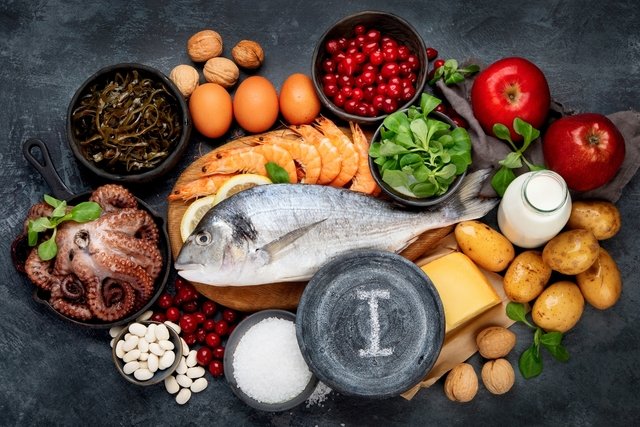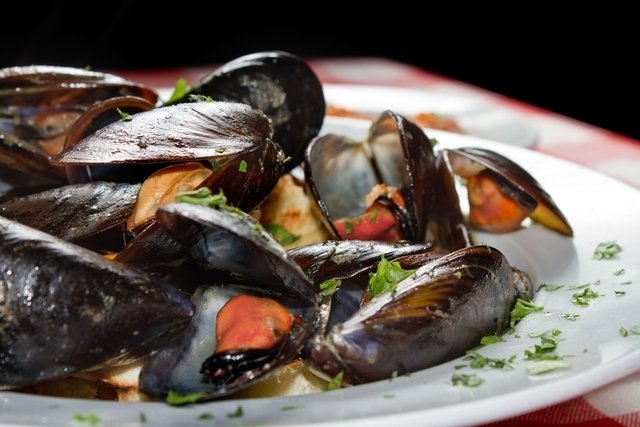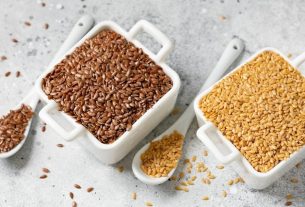The foods richest in iodine are those of marine origin such as mackerel or mussels, for example. However, there are other foods that are also rich in iodine, such as iodized salt, milk and eggs.
Iodine is an essential mineral for the production of thyroid hormones, which are important for growth and development, as well as for controlling some metabolic processes in the body. Check out other important functions of iodine in the body.
Iodine deficiency can cause a disease known as goiter, as well as a hormone deficiency, which in the most severe cases can cause severe and irreversible mental retardation in the child. For this reason, it is essential to include iodine in your diet.

List of foods rich in iodine
The following table indicates the amount of iodine per 100 g of foods of animal origin:
The following table indicates the amount of iodine per 100 g of foods of plant origin:
Some foods such as broccoli, cauliflower, Brussels sprouts and cabbage contain glucosinolates, compounds that, when consumed in excess, reduce the production of thyroid hormones and, therefore, should be consumed in moderation by those with thyroid problems. See all the foods to avoid for thyroid problems.
Recommended amount of iodine
The recommended maximum safe intake of iodine varies according to age, especially in the case of children, as it can range from 90 to 150 mcg. Find out in detail the amount of iodine for each age.
In the case of adults, the recommended amount is 150 mcg per day. This recommendation may vary in the case of pregnant women and women who breastfeed, and is normally higher.
Iodine deficiency
Iodine deficiency can cause goiter, a disease in which the thyroid gland is forced to work harder to absorb iodine and produce hormones and this causes the gland to increase in size. Goiter can cause difficulty swallowing, the appearance of lumps in the neck, coughing, hoarseness, shortness of breath and discomfort in the neck. Understand more about what it is and how to avoid goiter.
Furthermore, iodine deficiency can also cause disorders in the functioning of the thyroid, which can result in hyperthyroidism or hypothyroidism, disrupting the production of important hormones for the body.
In the case of children, iodine deficiency can cause goiter, cognitive difficulties, hypothyroidism or severe and irreversible mental retardation, as neurological and brain development can be seriously affected.
Too much iodine
Excessive consumption of iodine is also harmful and can cause diarrhea, headache, abdominal pain, nausea, vomiting, increased heart rate, bluish lips and fingertips. In more sensitive people, this excess can cause swelling of the lips, fever, joint pain, itching, bleeding and death.
Bibliography
- NATIONAL INSTITUTES OF HEALTH. Iodine. Available at: <https://ods.od.nih.gov/factsheets/Iodine-HealthProfessional/#h3>. Accessed on Aug 11, 2020
- NATIONAL INSTITUTE OF HEALTH – OFFICE OF DIETARY SYPLEMENTS. Nutrient Recommendations: Dietary Reference Intakes (DRI). 2019. Available at: <https://ods.od.nih.gov/HealthInformation/Dietary_Reference_Intakes.aspx>. Accessed on Aug 26, 2021
- USDA, FDA AND ODS-NIH. Database for the Iodine Content of Common Foods Release. 2020. Disponível em: <https://www.ars.usda.gov/northeast-area/beltsville-md-bhnrc/beltsville-human-nutrition-research-center/methods-and-application-of-food-composition-laboratory/mafcl-site-pages/iodine/>. Acesso em 26 ago 2021
- COZZOLINO Silvia. Bioavailability of nutrients. 4th. Brazil: Manole Ltda, 2012. 767-791.

Sign up for our newsletter and stay up to date with exclusive news
that can transform your routine!
Warning: Undefined array key "title" in /home/storelat/public_html/wp-content/plugins/link-whisper-premium/templates/frontend/related-posts.php on line 12
Warning: Undefined array key "title_tag" in /home/storelat/public_html/wp-content/plugins/link-whisper-premium/templates/frontend/related-posts.php on line 13





